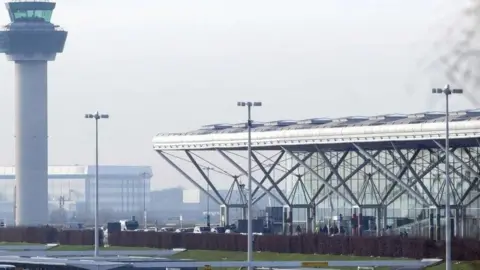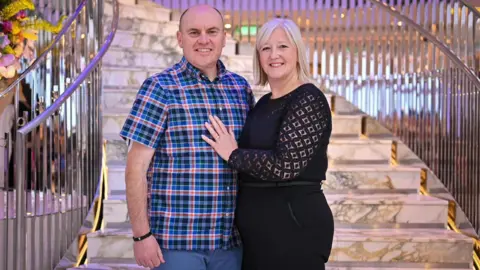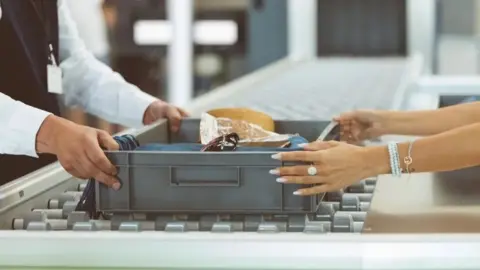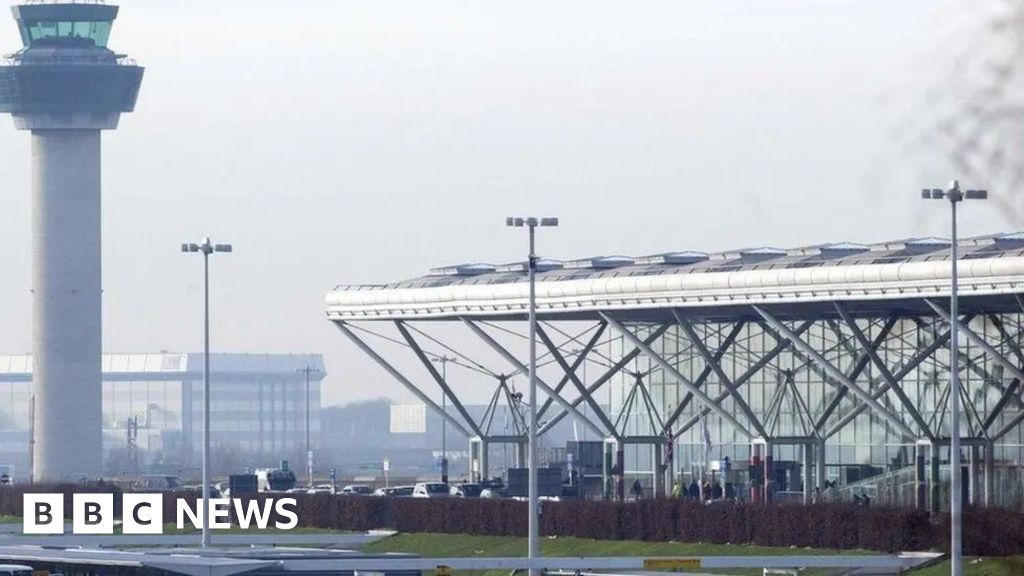 PA Media
PA MediaChildren and adults with type 1 diabetes were treated “appallingly” and made to feel like criminals at London Stansted Airport, according to numerous complaints made to the BBC.
A mother from Lowestoft in Suffolk claimed her teenage son was “determined never to fly again” after feeling “pressured” to undergo an X-ray scanner that could damage his medical equipment.
Others reported being taken to a room for searches while their essential equipment was kept at the security desk.
The airport said all its security staff receive “thorough training” to develop “understanding and awareness” of medical issues and apologized to a family for any “confusion or inconvenience” caused.
Why are type 1 diabetics affected by airport scanners?
- People with type 1 diabetes have to inject themselves with insulin, a hormone essential for survival, because their bodies no longer produce it.
- Many people with type 1 diabetes wear a pump that delivers insulin and a separate sensor that monitors blood sugar levels.
- Both can be damaged by airport scanners, so the The Civil Aviation Authority said these devices “must not be subjected to an X-ray check or go through the security scanner, but will be checked using alternative methods.”
 JDRF
JDRF“He doesn’t want to fly again”
April, from Lowestoft, said the journey from Stansted in July was her family’s first flight since her autistic son was diagnosed with type 1 diabetes at the age of 15.
She booked special assistance and brought a letter from her medical team.
“I told them he wasn’t allowed through the X-ray machine, but security insisted he go through,” she recalls.
“It felt like we had no choice, like we were being forced to do it.”
Her son was eventually taken to a private room for a search, she claimed, and a manager apologized to them.
“We didn’t know where his medicine bag was, which was really worrying. It wasn’t a pleasant experience for him: he is determined never to fly again.”
April said that when they arrived in Turkey, some equipment stopped working and they were in need of spare parts.
She said the journey back through Turkey was “great” but the experience at Stansted was “horrific”.
London Stansted Airport said no formal complaint had been made and offered a meeting with April’s family.
“Passengers always have the right to forgo a body scanner for medical or non-medical reasons and instead undergo a hand search in camera,” a spokesman said.
“If there was a miscommunication at the time, we are very sorry. We apologize for any distress or confusion this may have caused and would like to apologize from the bottom of our hearts.”
 Delivered
DeliveredCaroline and Wayne from Orpington often fly with their children Ellis (14) and Esme (11), who both suffer from type 1 diabetes.
“We have been to Stansted a few times and have never had a problem, it has always been very friendly,” said Caroline.
“What we experienced last month was completely different – not nice at all.”
“We were told to go into a room where a full body search was being conducted. There were about five or six staff members there conducting the search, observing it or filling out paperwork.
“Normally, in security, they just do a body search, pat down your clothes, take off your shoes, maybe take a swab. I started to worry that there was more to it – I felt like a criminal.”
Wayne, who had to wait with the luggage and wondered what was going on, described it as “frustrating.”
“You feel like you’re being bullied because you have children with type 1 diabetes. So the vacation wasn’t a particularly good start for us.
“There should be the same rule for all airports, it cannot be different,” he added.
 Delivered
Delivered“Lack of communication”
Natalie, from Harlow, said her 19-year-old son was “forced to take off his shoes and then led into a room” on July 15, with no explanation given.
She told BBC News: “I said to the staff, ‘I feel like criminals here. Is this going to happen every time? This is crazy?'”
“They said, ‘This is what we have to do.'”
She said he was examined and questioned about his blood glucose sensor.
“Then they put a piece of paper in front of him and said, ‘Sign this,’ but didn’t explain to him what he was supposed to sign,” she said.
She claimed that her son had had the same experience at Stansted when he was 17 and had just been diagnosed with the disease.
Natalie understands that it is “difficult” for airport security to control “so many different devices”.
“But why couldn’t the guy look me in the eye? It was the lack of communication and human kindness, it was the way they yell at people – it’s pretty intimidating.”
London Stansted Airport asked passengers to “undergo a private search to thoroughly check areas”, which “may include the need to remove clothing and take a device swab”.
“We don’t want to do this in public,” they continued.
“In a private search, an officer conducts the search in the presence of a superior officer, with women searching for women and men searching for men.”
 Ceri Jones
Ceri JonesCeri Jones, from the Rhondda Valley in Wales, was diagnosed with type 1 diabetes at the age of 52 after being admitted to intensive care and flew to Europe a few weeks later.
He said: “I was initially stopped at the conveyor belt and eyed with suspicion by the security team. Eventually I was escorted to a back room and asked some overzealous questions about my travel plans.”
“All my belongings were stored in an out of sight location, including my backup equipment and insulin.
“When I finally got back to the security checkpoints, a guy wearing rubber gloves had unpacked all of my carry-on luggage, including all of my insulin, and left it for me to clean up in front of the other passengers.
“The stress caused my blood sugar levels to skyrocket for hours.”
He said the experience in September 2023 had “added stress to an already difficult time. It was insensitive and reckless.”
 Getty Images
Getty ImagesType 1 diabetes charity JDRF is working with airports, the CAA and medical companies to increase consistency and awareness.
“For people with type 1 diabetes, travel can be extremely stressful because airport scanners are not compatible with certain life-saving medical technologies,” said Chris Bright, director of community partnerships and events.
“We call on airports to provide comprehensive training to all their staff so that people with type 1 diabetes can pass through airport security checks as easily as other passengers, without facing difficulties in receiving vital, life-saving medical treatments.”
A Facebook group supporting families with type 1 diabetes states: “We receive many posts with positive experiences of airport security, but unfortunately also many negative ones – both in UK airports and abroad.”
“Travelling as a diabetic is already a challenge, so we would like to see better training and awareness among all security staff.”
London Stansted Airport urged anyone dissatisfied to contact the airport so that it could “thoroughly investigate” the case and “take all necessary action”.
“We work hard to make every passenger’s experience at the airport as safe, stress-free and seamless as possible, while respecting the needs and circumstances of each individual passenger,” it said.
“If a passenger or their medical equipment cannot go through the security scanner and X-ray machines, or it is not recommended, the equipment will be checked using alternative methods and the passenger will be hand searched.
“All security personnel receive comprehensive training to ensure full compliance with government safety regulations and to provide the best possible customer service. This includes understanding and attentiveness to passengers travelling with a medical condition.”


